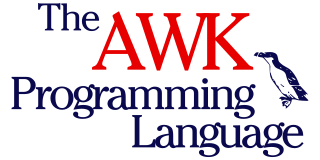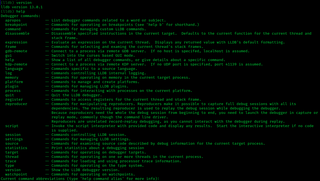
AWK is a domain-specific language designed for text processing and typically used as a data extraction and reporting tool. Like sed and grep, it is a filter, and is a standard feature of most Unix-like operating systems.
C is a general-purpose computer programming language. It was created in the 1970s by Dennis Ritchie, and remains very widely used and influential. By design, C's features cleanly reflect the capabilities of the targeted CPUs. It has found lasting use in operating systems, device drivers, and protocol stacks, but its use in application software has been decreasing. C is commonly used on computer architectures that range from the largest supercomputers to the smallest microcontrollers and embedded systems.

The GNU Debugger (GDB) is a portable debugger that runs on many Unix-like systems and works for many programming languages, including Ada, Assembly, C, C++, D, Fortran, Haskell, Go, Objective-C, OpenCL C, Modula-2, Pascal, Rust, and partially others.
In computer programming, an infinite loop is a sequence of instructions that, as written, will continue endlessly, unless an external intervention occurs, such as turning off power via a switch or pulling a plug. It may be intentional.
GNU Bison, commonly known as Bison, is a parser generator that is part of the GNU Project. Bison reads a specification in Bison syntax, warns about any parsing ambiguities, and generates a parser that reads sequences of tokens and decides whether the sequence conforms to the syntax specified by the grammar.

D, also known as dlang, is a multi-paradigm system programming language created by Walter Bright at Digital Mars and released in 2001. Andrei Alexandrescu joined the design and development effort in 2007. Though it originated as a re-engineering of C++, D is now a very different language drawing inspiration from other high-level programming languages, notably Java, Python, Ruby, C#, and Eiffel.

The syntax of the C programming language is the set of rules governing writing of software in C. It is designed to allow for programs that are extremely terse, have a close relationship with the resulting object code, and yet provide relatively high-level data abstraction. C was the first widely successful high-level language for portable operating-system development.

In computer programming, foreach loop is a control flow statement for traversing items in a collection. foreach is usually used in place of a standard for loop statement. Unlike other for loop constructs, however, foreach loops usually maintain no explicit counter: they essentially say "do this to everything in this set", rather than "do this x times". This avoids potential off-by-one errors and makes code simpler to read. In object-oriented languages, an iterator, even if implicit, is often used as the means of traversal.
The One Definition Rule (ODR) is an important rule of the C++ programming language that prescribes that classes/structs and non-inline functions cannot have more than one definition in the entire program and template and types cannot have more than one definition by translation unit. It is defined in the ISO C++ Standard 2003, at section 3.2. Some other programming languages have similar but differently defined rules towards the same objective.
Automata-based programming is a programming paradigm in which the program or part of it is thought of as a model of a finite-state machine (FSM) or any other formal automaton. Sometimes a potentially infinite set of possible states is introduced, and such a set can have a complicated structure, not just an enumeration.
Noweb, stylised in lowercase as noweb, is a literate programming tool, created in 1989–1999 by Norman Ramsey, and designed to be simple, easily extensible and language independent.
sizeof is a unary operator in the programming languages C and C++. It generates the storage size of an expression or a data type, measured in the number of char-sized units. Consequently, the construct sizeof (char) is guaranteed to be 1. The actual number of bits of type char is specified by the preprocessor macro CHAR_BIT, defined in the standard include file limits.h. On most modern computing platforms this is eight bits. The result of sizeof has an unsigned integer type that is usually denoted by size_t.
In computer science, manifest typing is explicit identification by the software programmer of the type of each variable being declared. For example: if variable X is going to store integers then its type must be declared as integer. The term "manifest typing" is often used with the term latent typing to describe the difference between the static, compile-time type membership of the object and its run-time type identity.
Getopt is a C library function used to parse command-line options of the Unix/POSIX style. It is a part of the POSIX specification, and is universal to Unix-like systems. It is also the name of a Unix program for parsing command line arguments in shell scripts.

The LLDB Debugger (LLDB) is the debugger component of the LLVM project. It is built as a set of reusable components which extensively use existing libraries from LLVM, such as the Clang expression parser and LLVM disassembler. LLDB is free and open-source software under the University of Illinois/NCSA Open Source License, a BSD-style permissive software license. Since v9.0.0, it was relicensed to the Apache License 2.0 with LLVM Exceptions.
Nemerle is a general-purpose, high-level, statically typed programming language designed for platforms using the Common Language Infrastructure (.NET/Mono). It offers functional, object-oriented, aspect-oriented, reflective and imperative features. It has a simple C#-like syntax and a powerful metaprogramming system.
In the C programming language, operations can be performed on a bit level using bitwise operators.
Tcov is a source code coverage analysis and statement-by-statement profiling tool for software written in Fortran, C and C++. Tcov generates exact counts of the number of times each statement in a program is executed and annotates source code to add instrumentation. It is a standard utility, provided free of cost with Sun Studio software.

Nim is a general-purpose, multi-paradigm, statically typed, compiled high-level systems programming language, designed and developed by a team around Andreas Rumpf. Nim is designed to be "efficient, expressive, and elegant", supporting metaprogramming, functional, message passing, procedural, and object-oriented programming styles by providing several features such as compile time code generation, algebraic data types, a foreign function interface (FFI) with C, C++, Objective-C, and JavaScript, and supporting compiling to those same languages as intermediate representations.
re2c is a free and open-source lexer generator for C, C++, Go, and Rust. It compiles declarative regular expression specifications to deterministic finite automata. Originally written by Peter Bumbulis and described in his paper, re2c was put in public domain and has been since maintained by volunteers. It is the lexer generator adopted by projects such as PHP, SpamAssassin, Ninja build system and others. Together with the Lemon parser generator, re2c is used in BRL-CAD. This combination is also used with STEPcode, an implementation of ISO 10303 standard.






